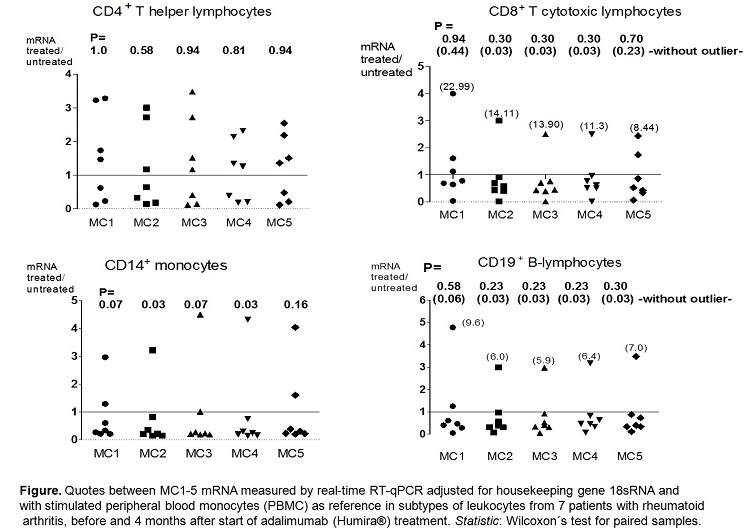Session Information
Session Type: Abstract Submissions (ACR)
Background/Purpose: We examined Adalimumab´s effects on melanocortin receptor subtype (MC)1-5 gene expression in important leukocyte subsets in rheumatoid arthritis (RA). The melanocortin system is a neuro-immunomodulatory system with anti-inflammatory and tolerance inducing properties. It consists of MC1-5 and their ligands, the melanocortins: α-, β-, γ- melanocyte stimulating hormones (MSH) and ACTH. Especially CD4+T helper (Th) lymphocytes and CD14+ monocytes express the genes of MC1, 2, 3 and 5. Binding of a melanocortin to its MC inhibits the nuclear translocation of transcription factor NFκB and thereby the synthesis of inflammatory mediators, such as TNFα, adhesionmolecules and NO. While the synthesis of the melanocortins is stimulated by TNFα, the MCs are upregulated by the melanocortins. Thus the melanocortin system is upregulated in inflammation. Adalimumab reduces circulating TNFα, and is therefore supposed to down-regulate melanocortin synthesis and MC expression.
Methods: Blood was drawn at pre-start and at 4 months of Adalimumab 40 mg every other week. Leukocyte subsets were isolated by magnetic beads coated with CD4, CD8, CD14 and CD19 mAB. RNA was extracted and RT-qPCR performed with primers and probes specific to MC1-5, TNFα, TGFβ and IL-10.
Results: 6 females and 1 male with RA according to ACR criteria were examined. Median age 48.0 ±7.2 yrs (SD), disease duration 21 ±71 months. 4 were treated with methotrexate 25 mg/w and 3 with leflunomid 20 mg/d. 3 patients took prednisolon, mean dose 6.67 mg/d. At start and 4 months´ therapy, CRP was 3.0 ±22.1 and 2.9 ±0.6mg/L (median ±SD), respectively, hemoglobin 8.4 ±1.5 and 8.6 ±0.4 mmol/L, DAS28 4.9 ±1.5 and 2.0 ±0.6. At 4 months none took prednisolon. Adalimumab significantly reduced MC2, 3 and 4 mRNA in CD8+, CD14+ and CD19+ leukocyte subsets. In CD4+ Th lymphocytes there was no uniform reaction. IL-10 was lowered in CD4+, and tended as TNFα to be so in CD14+ cells, TGFβ unchanged.
Conclusion: Here we show that Adalimumab down-regulates the MC2, 3 and 4 gene expression in the CD14+ monocytes in RA. Thus we have uncovered a new peripheral melanocortin signalling pathway through MC4 in monocytes. Monocytes are known to have an anti-inflammatory autocrin circuit based on the melanocortins, previously thought to operate solely through MC3 as shown in experimental gouty arthritis. Interestingly, our results show, that the MC1-5 gene expression of the CD4+Th lymphocyte does not react uniformly to Adalimumab therapy. The CD4+Th cell has a superior role in the immune reaction, as the central conductor of other cell types. Therefore, it is not surprising, that the powerful melanocortin system in just this very important cell type, seems to be controlled via several redundant mechanisms, interacting to exert fine tuning of the immune reaction.
Disclosure:
M. Andersen,
None;
M. K. Meyer,
None;
I. Nagaev,
None;
O. Nagaeva,
None;
J. E. S. Wikberg,
None;
L. Mincheva-Nilsson,
None;
G. N. Andersen,
None.
« Back to 2014 ACR/ARHP Annual Meeting
ACR Meeting Abstracts - https://acrabstracts.org/abstract/tnf-alpha-inhibitors-normalizes-melanocortin-receptor-subtype-2-3-and-4-expression-in-cd8-cd14-and-cd19-leukocyte-subsets-in-rheumatoid-arthritis/

